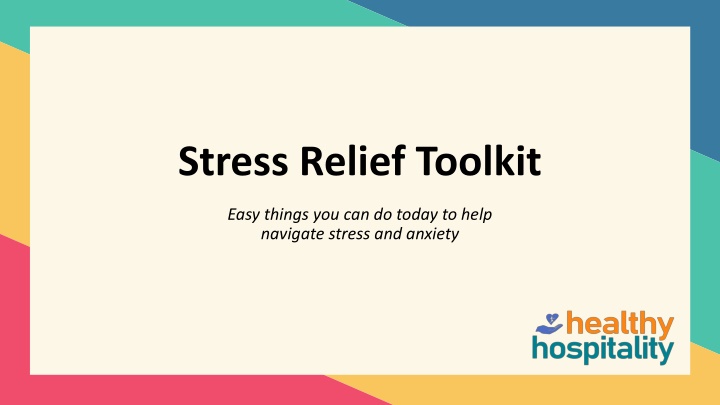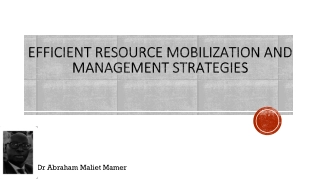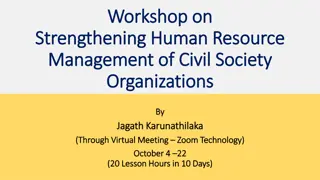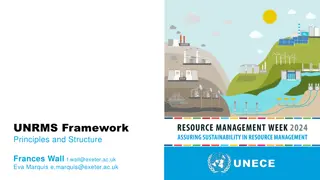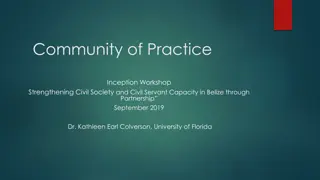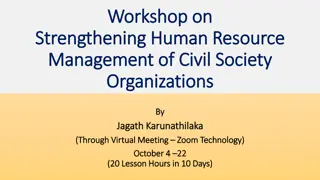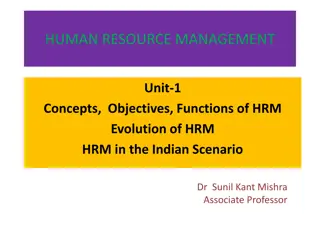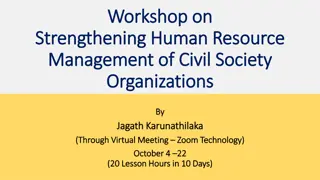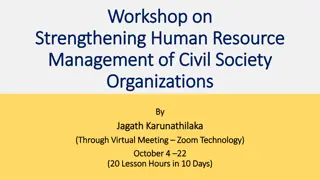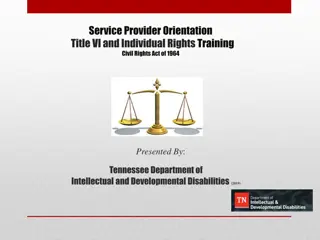Workshop on Strengthening Human Resource Management of Civil Society Organizations
This workshop focuses on enhancing HR management skills within civil society organizations. Topics include business code practice, recruitment, rewards, superannuation, severance, and more. Participants will learn to navigate employment practices, compliance, and legal provisions to optimize organizational performance.
Download Presentation

Please find below an Image/Link to download the presentation.
The content on the website is provided AS IS for your information and personal use only. It may not be sold, licensed, or shared on other websites without obtaining consent from the author.If you encounter any issues during the download, it is possible that the publisher has removed the file from their server.
You are allowed to download the files provided on this website for personal or commercial use, subject to the condition that they are used lawfully. All files are the property of their respective owners.
The content on the website is provided AS IS for your information and personal use only. It may not be sold, licensed, or shared on other websites without obtaining consent from the author.
E N D
Presentation Transcript
Stress Relief Toolkit Easy things you can do today to help navigate stress and anxiety
Below are several easy tools that you can start implementing today to better your health and overall well-being. Utilizing just a couple of these methods will help you manage your stress and anxiety throughout the day: 1. Get rid of the guilt 2. Practice makes perfect 3. Learn how to control your breathing 4. Move out of your head and into your body 5. Try some forest therapy 6. Practice mindfulness 7. Set appointments to worry 8. Use your joy triggers for a 60-second reset 9. Grounding 10. Weight training and exercise 11. Chew gum 12. Journal 13. Laugh
1. Get rid of the guilt Give yourself permission to relax. It s necessary to recharge our batteries, and we need to accept and allow for that. Recognize that relaxation is essential and not a guilty pleasure. 2. Practice makes perfect Just like any skill you want to master, you need to practice relaxing. We usually attempt to move into relaxation mode when we re in crisis and then try to learn to relax in that moment. That s like trying to learn to swim in the middle of a wave instead of in calm waters.
3. Learn how to control your breathing Studies have shown that you can lower your heart rate by controlling your breathing. Here s a technique called the squeegee breath: Close your eyes. Imagine a window squeegee at the top of your head. As you breathe out, imagine the squeegee pushing toxic thoughts and energy down to your toes and out your body, like dirty water at the bottom of a window. Then, breathe in deeply and imagine positive thoughts coming in like fresh, clean water. Continue to breathe in and out. Playing a wind instrument, such as a flute or trumpet, can also be calming. They can help improve breathing patterns because you must control your breath while making notes.
Another breathing technique to try: Rock and Roll breathing The psychotherapist Lesley Alderman outlined a technique which she called rock and roll breathing. Controlled breathing has been shown to reduce stress, increase alertness and boost the immune system. Rock and roll breathing, which can also strengthen your core, goes likes this: Sit up straight on the floor or the edge of a chair and place your hands on your belly. As you inhale, lean forward and expand your belly. As you exhale, squeeze the breath out and curl forward while leaning backward; exhale until you re completely empty of breath. Repeat 10 to 20 times.
4. Move out of your head and into your body Changing physical sensations during moments of stress can help quiet anxious thoughts. Anything soothing to the body can help. It can be as simple as cocooning in a warm blanket or doing some mindful movements or exercises. Movements that release muscle tension are key. One is called the ragdoll. Let your shoulders drop down like a ragdoll you ll be surprised as to how much tension you re holding. 5. Try some forest therapy Forest therapy is simply getting outside into green space. Studies have shown it reduces blood pressure and boosts mood. Even if you can t get outside, sitting next to a window can help you unwind and relax.
6. Practice mindfulness Mindfulness is about being present in the moment. When you look too far ahead, you can become anxious. So to relax, try to enjoy and take in each moment instead of worrying about what s happening next. Another method: Follow the 3-3-3 rule. Look around you and name three things you see. Then, name three sounds you hear. Finally, move three parts of your body -- your ankle, fingers, or arm. Whenever you feel your brain going 100 miles per hour, this mental trick can help center your mind, bringing you back to the present moment. Download these top-rated apps to help you be more mindful: Sanvello, Headspace, Calm
7. Set appointments to worry Spending your whole day worrying is damaging to your long-term health, so one strategy is to schedule discrete parts of your day when ideally, but maybe not always you ll get your worrying out of the way so you can move on, says Dr. Jenny Taitz in an article for Smarter Living.
8. Use your joy triggers for a 60-second reset If you find yourself particularly distracted or stressed out, try a 60- second reset, a wonderful tip from Arianna Huffington. I use my reset many times a day, it takes 60 seconds, Ms. Huffington said. You basically put together the things that are joy triggers. It could be photos of people you love, pets, quotes, landscapes, music you love, a breathing pace. Gratitude is the greatest antidote to stress.
9. Grounding First, feel your feet on the floor. Really feel your feet on the floor. Are they warm or cold? Do they tingle at all? What does it feel like when you press down with one foot? Now try pressing down with the other, alternating between the two. Allow yourself to breathe fully. You don t need to take a huge, deep breath. Just let yourself really breathe. Now back to the feet. Press both feet into the ground as hard as you can, hold for 4, 3, 2, 1, and release. And now, just let your feet rest against the ground. Feel the actual gravity, that inherent connectivity between you and the ground.
10. Weight training and exercise Lifting weights might help your stress, according to a timely new study of anxiety and resistance training. Scientists only recently have begun to investigate whether and how weight training might also affect mental health. A 2018 review of studies, for instance, concluded that adults who lift weights are less likely to develop depression than those who never lift. In another study, women with clinical anxiety disorders reported fewer symptoms after taking up either aerobic or weight training.
11. Chew gum A study out of Swinburne University found that people who chew gum while multitasking under stress had lower cortisol levels, reduced levels of stress and anxiety, and increased levels of alertness and performance. Another found that chewing gum can improve a negative mood, and increase levels of peace and calm. Scientists don't know precisely why, but believe it's because chewing gum tends to improve blood flow in the brain.
12. Journal According to psychologist L. Kevin Chapman, PhD, "When we experience stress and the negative emotions associated with it, we typically stay in our own heads and do little to address our thinking. Instead of hanging out with toxic thoughts, he suggests reducing anxiety with "objective recording." Here's how you do it: Draw a line down the middle of a sheet of paper. Mark the left column, "Negative things I'm saying to myself." Mark the right, "Alternatives." Fill out both.
13. Laugh Laughter is an easy, cheap, and surprisingly effective way of reducing anxiety and boosting mood. The Mayo Clinic says laughing stimulates your heart and lungs, bringing in lots of oxygen-rich air. It also ups your endorphins, the brain's feel-good neurotransmitter, and improves your immune functioning. Get in a quick laugh: watch news bloopers.
Rally for Health: https://www.rallyhealth.com/mental-health/8-techniques-to-help- you-master-the-art-of-relaxation https://www.rallyhealth.com/stress/how-to-worry-better https://www.rallyhealth.com/mental-health/finding-hope-when- things-feel-gloomy https://www.rallyhealth.com/fitness/weight-training-may-help- ease-anxiety Sanvello: https://www.sanvello.com/blog/if-youre-feeling-overwhelmed- anxious-or-depressed-read-this/ Inc.com https://www.inc.com/melanie-curtin/7-science-backed-ways-to- reduce-anxiety-now.html WebMD https://www.webmd.com/mental-health/features/ways-to- reduce-anxiety Sources & Resources to learn more:
